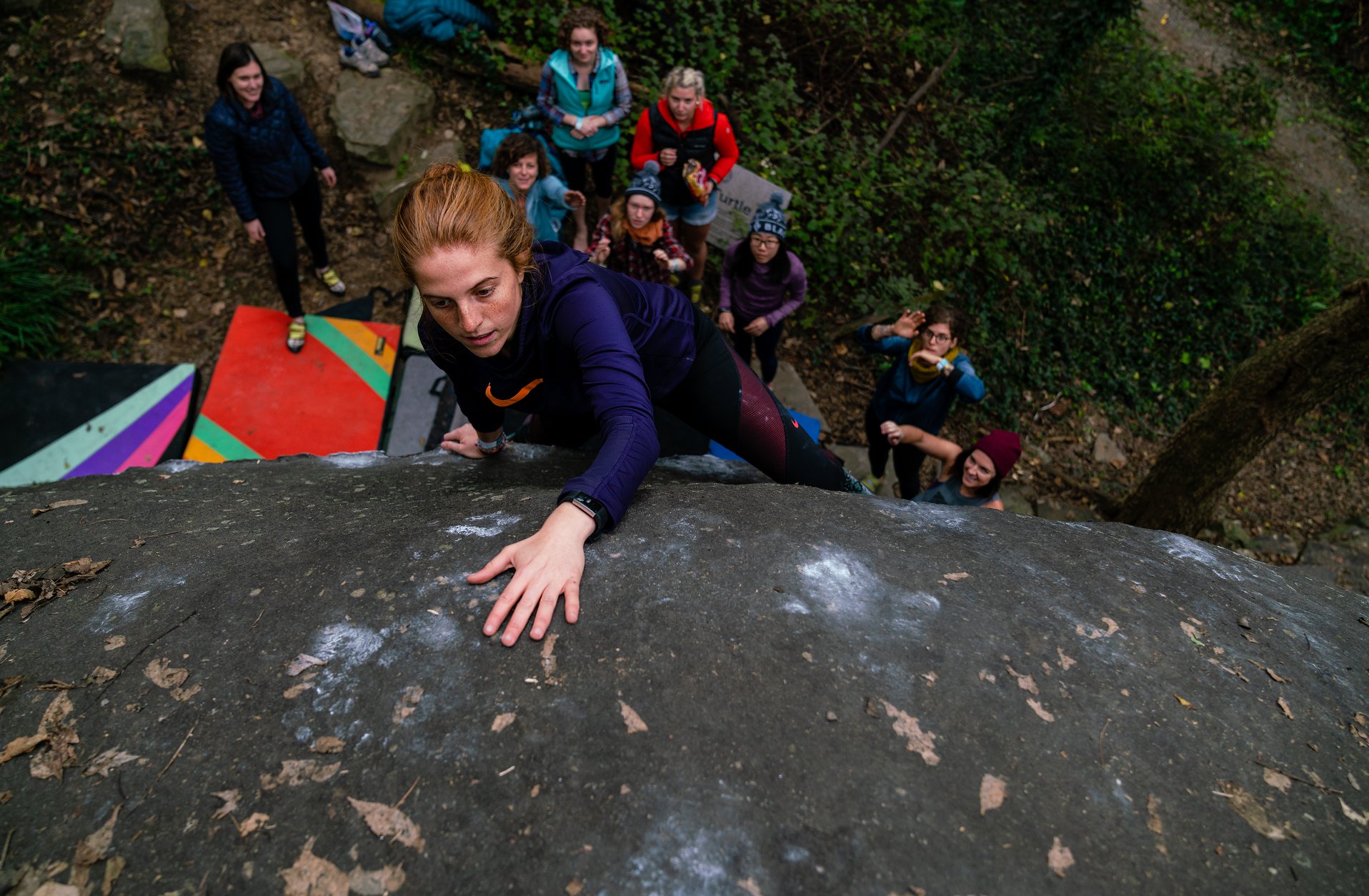Confronting Fear at the Chattanooga Women's Climbing Festival
By Elaine Elliott
Photo by Vikki Glinskii of the RV Project. Courtesy of Flash Foxy.
“What are you scared of? What can you do about it? And why haven’t you done it yet?”
These are the last three questions Nina Williams asked during her presentation at the Women’s Climbing Festival’s Community Night, where the public joined WCF participants at Chattanooga Whiskey to hear her talk about highball accomplishments.
But the presentation went far beyond highballs. It tugged at the heartstrings of everyone in the room because each of us has a fear, even the bravest of climbers. And aside from physically climbing, there’s a lot to be afraid of in the sport.
Fear of gender stereotypes - for both men and women. Fear of never finding a mentor. Fear of reaching out to potential partners. Fear of traveling to unknown places. Fear of criticism for not sending a certain grade. Fear of failure to climb a project. Fear of starting a business in the outdoor industry. Fear of lacking a safe space to vent your concerns about our community’s future. The list goes on.
“It’s one thing to be scared on the rock because it’s a natural instinctive fear,” explains Williams. “But the more interesting fears to me are these social fears of being unsure of ourselves and what others think of our achievements and progress, or speaking to new people, or not fitting in… those types of fears are what really hold us back.”
Photo by Nikki Smith. Courtesy of Flash Foxy.
For the past three years, Flash Foxy has created a space where women can express these doubts and concerns during the Women’s Climbing Festival. The event started in Bishop in 2016 and now has a second location in Chattanooga each fall. Over 343 women from 41 states and 3 different countries attended the Chattanooga festival this past October.
Flash Foxy partnered with 12 local businesses during the festival, including the woman-owned yoga studio Peace.Strength.Yoga, and woman-owned guiding service She Moves Mountains East Coast, as well as climbing gyms, catering services, a brewery, and a distillery.
Not only has the festival supported the regional economy by collaborating with small businesses, it also promotes recreational tourism in the town by bringing awareness of Chattanooga to a broader audience of climbers across the nation. Many participants came to the city for the first time, including Williams and other athletes like Nikki Smith and Sammy Podhurst.
Photo by Nikki Smith. Courtesy of Flash Foxy.
California native Amanda Nelson attended the inaugural WCF in Bishop, which inspired her to also visit Chattanooga for the first time when the event branched out to Tennessee.
“I remember seeing photos of Stone Fort and Dayton’s Vapor Roof and all these other boulders in the South with Fontainebleau-style rock and thinking to myself, 'I wanna go there,'” says Nelson. “So the minute I heard the festival was going to Chattanooga, it was obviously a sign that I needed to visit.”
Since its fruition, Nelson has always appreciated how the Women’s Climbing Festival brings together climbers from all over the country.
“When I got into climbing, it was because of a person I was dating, but I wanted to show that I loved it on my own," she says. "Sometimes it felt hard to strike up a conversation with a woman climber… I went to this festival and realized there were so many woman who feel the same way – who lacked woman mentors.”
“[The Women’s Climbing Festival] raises awareness to diversify these environments, and there is so much rawness that goes into the festivals and panels that people start to ask questions without being afraid,” says Nelson.
A common question often emerges: why do we need these climbing festivals when women can get together on their own?
“Climbing is an intimidating sport because of how difficult it is physically, but there are also a lot of social nuances that go on that no one ever talks about,” explains Williams in regards to gender differences in climbing. “There are a lot of women out there who have positive personal experiences with climbing, and that’s totally valid… But these festivals are outlets for people who haven’t had those experiences.”
Photo by Sarah Klintworth. Courtesy of Flash Foxy.
Each festival buzzes with an undeniable psych derived from mutual encouragement and inclusivity. When someone wins a raffle prize, the entire crowd cheers. Strangers become friends and plan future trips to meet again. During clinics, women immediately collaborate to problem-solve climbs. At October's festival, over 80 attendees volunteered Sunday morning to tackle stewardship projects when they easily could have climbed instead.
The festival encourages participants to reach out to new climbing partners and mentors, spark discussions about diversity in the climbing community, and get involved in the scene through personal interests whether they be volunteering, filmmaking, photography, or routesetting.
WCF might only last three days, but it leaves us with open-ended questions like what do we want the future of climbing to look like? How can we make the sport more welcoming to others? How can we work together to conquer fears and stereotypes? And why haven’t we done it yet?
Photo by Vikki Glinskii of the RV Project. Courtesy of Flash Foxy.





